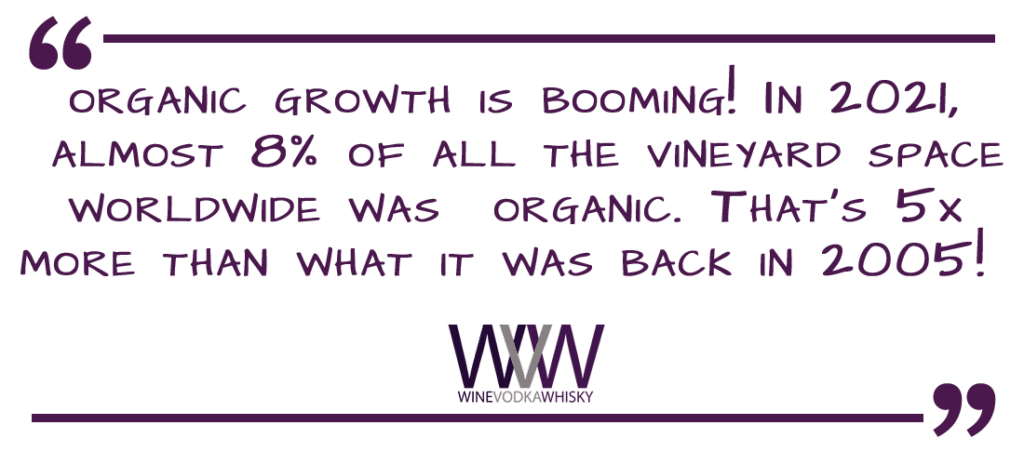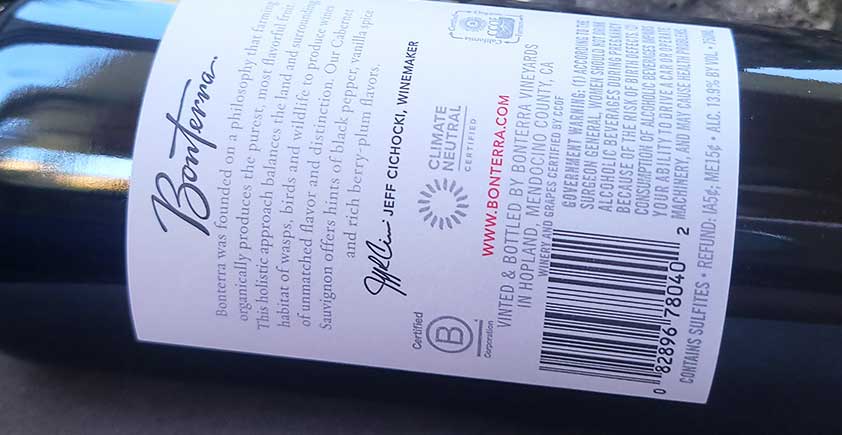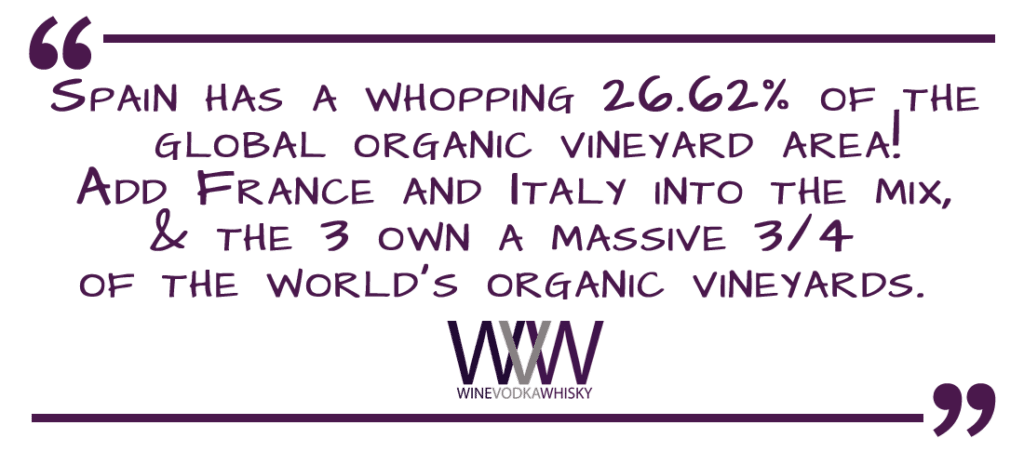Organic wine has gained popularity in recent years, driven by a growing awareness of sustainable and eco-friendly practices in winemaking. In fact, in 2021 nearly 8% of all vineyard areas in the world were organic. That is 5X greater than in 2005! If you’re curious about what makes it unique, its impact on the environment, or how it compares to conventional wine, you’ve come to the right place.
Let’s explore the world of organic wine, answering common questions to help you better understand and appreciate this environmentally conscious approach to winemaking.

What is Organic Wine?
Organic wine refers to wine made from grapes that have been grown without the use of synthetic pesticides, herbicides, fertilizers, or genetically modified organisms (GMOs). The production follows specific standards and regulations to ensure the grapes are cultivated in an environmentally friendly manner. These standards do vary across different countries and regions.
In the United States, the National Organic Program (NOP) sets the guidelines. First and foremost, understand the label! There is a difference between organic wine versus wine made with organic grapes,
Organic Wine Guidelines:
- A certified organic agent inspects the farm to make sure all of the required processes are being followed
- All grapes and other agricultural ingredients (including yeast) must be certified organic
- Non-agricultural ingredients must be specifically allowed on the National List and may not exceed a combined 5% of the total product (excluding salt and water). The National List is a list of nonorganic substances that can be used in organic production
- Sulfites can not be added
- Labels must state the name of the certifying agent (certified organic by *** or similar).

Made with Organic Grapes Guidelines:
- 100% of all grapes must be certified organic
- Any remaining agricultural ingredients (like yeast) are not required to be organic but must be produced without genetic engineering techniques
- Any non-agricultural ingredients must be specifically allowed on the National List
- Sulfites may be added to yield less than 100 parts per million in finished grape wine, but may not be added to wine “made with” other organic fruit (e.g., apples)
- Labels must state the name of the certifying agent
FAQs About Organic Wines
Does Organic Wine Have Sulfites?
Yes, organic wine can contain sulfites, although the sulfite levels are generally lower compared to conventional wines.

Should Organic Wine be Certified?
Yes, organic wine should be certified.
Does Organic Wine Have Less Sugar?
Organic wine doesn’t necessarily have less sugar compared to non organic wine. The sugar content in wine is primarily determined by the grape variety used and the winemaking process, rather than whether the wine is organic or not.
Is Organic Wine Better for You?
Organic wine is often considered better for you because the grapes are grown without the use of synthetic chemicals and pesticides. The winemaking process itself should also follow organic practices, which include using only approved organic additives and avoiding the use of sulfites. These factors contribute to the belief that wine is healthier and better for the body.
Is Organic Wine Easier on the Liver?
There is no scientific evidence to suggest that organic wine is specifically easier on the liver compared to conventional wine. The liver processes alcohol in the same way regardless of whether the wine is organic or not. It is important to consume alcohol in moderation and consult with a healthcare professional for personalized advice.
Is Organic Wine Gluten Free?
Yes, organic wine can be gluten free as it is made from grapes and does not contain any gluten containing ingredients. However, it’s important to note that the main ways conventional wine can come into contact with gluten is through the use of micronized wheat as a filtering agent, and the use of wheat paste to seal oak barrels. So if you are looking to be sure your wine is gluten free, research the fermentation process and look for things like stainless steel tanks and fining agents.
Are Organic Wine’s Vegan?
Yes, organic wines can be vegan. However, not all organic wines are automatically vegan. Some organic winemakers use animal based fining agents (such as egg whites, fish bladders, or gelatin) during the winemaking process, which may make the wine non-vegan. Vegan wine will be specifically labeled as “vegan” or “suitable for vegans”.
Popular Organic Wine Brands
Frey Vineyards
Frey Vineyards is one of the pioneers of organic and biodynamic winemaking in the United States. Located in Mendocino County, California, they have been producing organic wines since 1980. Frey Vineyards is committed to sustainable agriculture. Their wines are made from certified organic grapes without the use of synthetic pesticides or herbicides. They also use biodynamic farming practices to enhance soil health. Frey offers a wide range of organic options, including reds, whites, and blends.
Bonus for all you carb conscious wine drinkers out there. Frey does not add extra sugar to the wines. The wines are very dry, so carbohydrate and sugar levels are very low. Each wine has around 3 or 4 grams of carbs per 5 ounce glass.
Double bonus, these wines are also vegan!
Bonterra Organic Vineyards
Bonterra is another well known California winery with a strong commitment to organic and sustainable farming. They have been producing organic wines since the late 1980s. Bonterra’s vineyards are certified organic and biodynamic, and they are dedicated to producing high quality wines. Their portfolio includes a variety of organic wines, including Chardonnay, Merlot, Cabernet Sauvignon, and more, all made from organic grapes and crafted with care for the environment.
Beyond being certified organic, they are also a certified B corporation, regenerative organic certified, climate neutral certified and TRUE zero waste certified.
Neal Family Vineyards
In 1998, Mark Neal embarked on the journey to establish Neal Family Vineyards. Over time, the winery has earned a stellar reputation, particularly for its exceptional Cabernet Sauvignon. The Cabernet is celebrated for its quality and its ability to eloquently convey the unique terroir of Napa Valley. Mark Neal is widely recognized as a leading figure in organic and biodynamic farming within Napa Valley. He currently oversees the largest certified organic acreage, totaling 841 acres, as the proprietor of both Jack Neal and Son Vineyard Management (JNS) and Neal Family Vineyards.
These three organic wine brands exemplify a dedication to environmentally friendly and sustainable winemaking practices, producing wines that not only taste great but also promote the health of the land and ecosystems in which the grapes are grown.
Organic vs Biodynamic Wine
Organic and biodynamic wine are both produced with a focus on sustainability and environmental consciousness, but they differ in their farming and winemaking practices. Here’s a comparison both:

Farming Practices
Organic:
Pesticides and Chemicals: This wine is made from grapes grown using organic farming practices. This means that synthetic pesticides, herbicides, and chemical fertilizers are avoided. Instead, natural alternatives and organic approved substances are used to manage pests and enhance soil fertility.
Certification: Organic vineyards and wineries must adhere to specific organic certification standards set by their respective countries or regions.
Biodynamic:
Holistic Approach: Biodynamic farming takes a more holistic approach, considering the vineyard as part of a larger ecosystem. It follows principles set out by Rudolf Steiner and incorporates mystical and astrological elements.
Biodiversity: Biodynamic vineyards often focus on biodiversity, using cover crops, composting, and natural preparations to enhance soil health and encourage a self sustaining ecosystem.
Timing: Planting, harvesting, and other vineyard activities are often timed according to lunar and celestial cycles.
Grapes
Organic:
Grape Quality: The primary focus in production is on the quality of the grapes. Healthy, organic grapes are essential for making high-quality organic wine.
Biodynamic:
Connection to Environment: Biodynamic farming emphasizes the connection between the grapes and their environmental factors like soil, climate, and geography. It’s believed to result in wines that express their unique sense of place.
Winemaking
Organic:
Sulfites: Organic wines may contain sulfites, which are used in winemaking as a preservative. However, the levels of sulfites are usually lower than those found in conventional wines.
Additives: The use of additives is limited, favoring a more natural approach to fermentation and aging.
Biodynamic:
Minimal Intervention: Biodynamic winemaking typically involves minimal intervention. It often avoids the use of cultured yeasts and relies on natural fermentation.
No Additives: Biodynamic wines often have lower levels of sulfites compared to even organic wines and may be made with little to no added sulfites.
As you can see, both organic and biodynamic wines prioritize sustainable and natural farming practices. But, biodynamic farming takes a more spiritual and holistic approach. They are considered a subset of organic wines, with a focus not only on organic farming but also on a deeper connection to the land and the cosmos in the belief that it enhances the quality and uniqueness of the wine.
What Are Dry Farmed Wines?
The key difference between organic and dry farming wine lies in their approach to water usage. Organic wine production is focused on organic farming practices that may or may not involve irrigation, while dry farming intentionally avoids irrigation to conserve water resources.
Due to the nature of water conservation, dry farming can stress grapevines, which can lead to smaller berry size and lower yields. Some argue that this stress can result in grapes with more concentrated flavors and character.
Both approaches share a commitment to sustainability and environmental responsibility, but they achieve it through different means. Dry farming is more specifically focused on water conservation.

Should I Buy an Organic Wine?
Organic wine offers a sustainable choice for environmentally conscious individuals. While it may not necessarily be healthier than conventional wine, it does provide an option for those seeking specific attributes like low sugar or sulfites. By supporting organic wine production, we may contribute to a greener future while still enjoying our favorite drink. So, let’s raise a glass to going green with organic wine! Cheers!
All statistics provided by Statista
